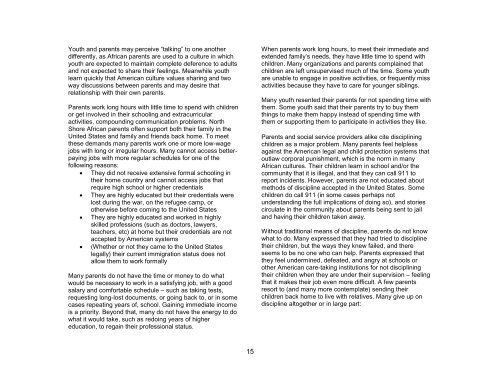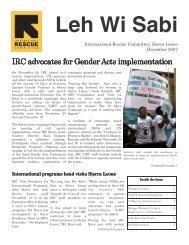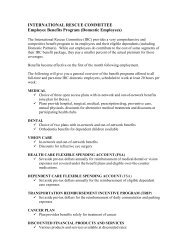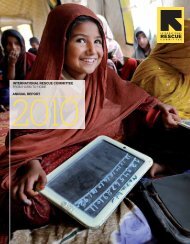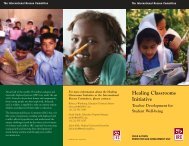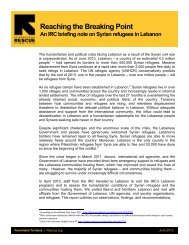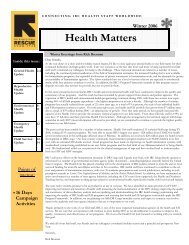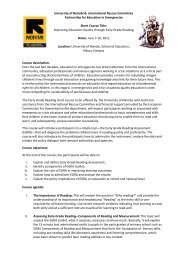The Issues and Assets of African Youth on Staten Island's North Shore:
The Issues and Assets of African Youth on Staten Island's North Shore:
The Issues and Assets of African Youth on Staten Island's North Shore:
- No tags were found...
You also want an ePaper? Increase the reach of your titles
YUMPU automatically turns print PDFs into web optimized ePapers that Google loves.
<str<strong>on</strong>g>Youth</str<strong>on</strong>g> <str<strong>on</strong>g>and</str<strong>on</strong>g> parents may perceive “talking” to <strong>on</strong>e anotherdifferently, as <str<strong>on</strong>g>African</str<strong>on</strong>g> parents are used to a culture in whichyouth are expected to maintain complete deference to adults<str<strong>on</strong>g>and</str<strong>on</strong>g> not expected to share their feelings. Meanwhile youthlearn quickly that American culture values sharing <str<strong>on</strong>g>and</str<strong>on</strong>g> twoway discussi<strong>on</strong>s between parents <str<strong>on</strong>g>and</str<strong>on</strong>g> may desire thatrelati<strong>on</strong>ship with their own parents.Parents work l<strong>on</strong>g hours with little time to spend with childrenor get involved in their schooling <str<strong>on</strong>g>and</str<strong>on</strong>g> extracurricularactivities, compounding communicati<strong>on</strong> problems. <strong>North</strong><strong>Shore</strong> <str<strong>on</strong>g>African</str<strong>on</strong>g> parents <str<strong>on</strong>g>of</str<strong>on</strong>g>ten support both their family in theUnited States <str<strong>on</strong>g>and</str<strong>on</strong>g> family <str<strong>on</strong>g>and</str<strong>on</strong>g> friends back home. To meetthese dem<str<strong>on</strong>g>and</str<strong>on</strong>g>s many parents work <strong>on</strong>e or more low-wagejobs with l<strong>on</strong>g or irregular hours. Many cannot access betterpayingjobs with more regular schedules for <strong>on</strong>e <str<strong>on</strong>g>of</str<strong>on</strong>g> thefollowing reas<strong>on</strong>s: <str<strong>on</strong>g>The</str<strong>on</strong>g>y did not receive extensive formal schooling intheir home country <str<strong>on</strong>g>and</str<strong>on</strong>g> cannot access jobs thatrequire high school or higher credentials <str<strong>on</strong>g>The</str<strong>on</strong>g>y are highly educated but their credentials werelost during the war, <strong>on</strong> the refugee camp, orotherwise before coming to the United States <str<strong>on</strong>g>The</str<strong>on</strong>g>y are highly educated <str<strong>on</strong>g>and</str<strong>on</strong>g> worked in highlyskilled pr<str<strong>on</strong>g>of</str<strong>on</strong>g>essi<strong>on</strong>s (such as doctors, lawyers,teachers, etc) at home but their credentials are notaccepted by American systems (Whether or not they came to the United Stateslegally) their current immigrati<strong>on</strong> status does notallow them to work formallyMany parents do not have the time or m<strong>on</strong>ey to do whatwould be necessary to work in a satisfying job, with a goodsalary <str<strong>on</strong>g>and</str<strong>on</strong>g> comfortable schedule – such as taking tests,requesting l<strong>on</strong>g-lost documents, or going back to, or in somecases repeating years <str<strong>on</strong>g>of</str<strong>on</strong>g>, school. Gaining immediate incomeis a priority. Bey<strong>on</strong>d that, many do not have the energy to dowhat it would take, such as redoing years <str<strong>on</strong>g>of</str<strong>on</strong>g> highereducati<strong>on</strong>, to regain their pr<str<strong>on</strong>g>of</str<strong>on</strong>g>essi<strong>on</strong>al status.When parents work l<strong>on</strong>g hours, to meet their immediate <str<strong>on</strong>g>and</str<strong>on</strong>g>extended family‟s needs, they have little time to spend withchildren. Many organizati<strong>on</strong>s <str<strong>on</strong>g>and</str<strong>on</strong>g> parents complained thatchildren are left unsupervised much <str<strong>on</strong>g>of</str<strong>on</strong>g> the time. Some youthare unable to engage in positive activities, or frequently missactivities because they have to care for younger siblings.Many youth resented their parents for not spending time withthem. Some youth said that their parents try to buy themthings to make them happy instead <str<strong>on</strong>g>of</str<strong>on</strong>g> spending time withthem or supporting them to participate in activities they like.Parents <str<strong>on</strong>g>and</str<strong>on</strong>g> social service providers alike cite discipliningchildren as a major problem. Many parents feel helplessagainst the American legal <str<strong>on</strong>g>and</str<strong>on</strong>g> child protecti<strong>on</strong> systems thatoutlaw corporal punishment, which is the norm in many<str<strong>on</strong>g>African</str<strong>on</strong>g> cultures. <str<strong>on</strong>g>The</str<strong>on</strong>g>ir children learn in school <str<strong>on</strong>g>and</str<strong>on</strong>g>/or thecommunity that it is illegal, <str<strong>on</strong>g>and</str<strong>on</strong>g> that they can call 911 toreport incidents. However, parents are not educated aboutmethods <str<strong>on</strong>g>of</str<strong>on</strong>g> discipline accepted in the United States. Somechildren do call 911 (in some cases perhaps notunderst<str<strong>on</strong>g>and</str<strong>on</strong>g>ing the full implicati<strong>on</strong>s <str<strong>on</strong>g>of</str<strong>on</strong>g> doing so), <str<strong>on</strong>g>and</str<strong>on</strong>g> storiescirculate in the community about parents being sent to jail<str<strong>on</strong>g>and</str<strong>on</strong>g> having their children taken away.Without traditi<strong>on</strong>al means <str<strong>on</strong>g>of</str<strong>on</strong>g> discipline, parents do not knowwhat to do. Many expressed that they had tried to disciplinetheir children, but the ways they knew failed, <str<strong>on</strong>g>and</str<strong>on</strong>g> thereseems to be no <strong>on</strong>e who can help. Parents expressed thatthey feel undermined, defeated, <str<strong>on</strong>g>and</str<strong>on</strong>g> angry at schools orother American care-taking instituti<strong>on</strong>s for not discipliningtheir children when they are under their supervisi<strong>on</strong> – feelingthat it makes their job even more difficult. A few parentsresort to (<str<strong>on</strong>g>and</str<strong>on</strong>g> many more c<strong>on</strong>template) sending theirchildren back home to live with relatives. Many give up <strong>on</strong>discipline altogether or in large part:15


